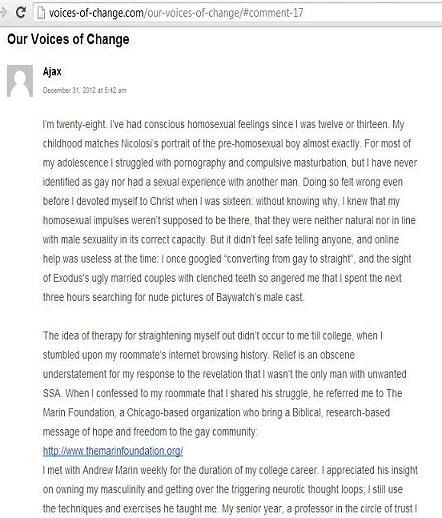Does a ban on reparative therapy infringe on the First Amendment rights of reparative therapists?
This question is at the heart of the debate (and a couple of lawsuits) regarding California’s law banning reparative therapy for minors. The law was set to take effect tomorrow but has been postponed pending a full hearing.
According to Eugene Volokh, the issue of professional-client speech has not been well-defined by the courts. In 2004, Volokh offered an excellent summary of issues relating to what the state can do to regulate professional speech to clients. In the post, Volokh noted that professionals are subject to speech restrictions that other do not experience. For instance, the state can impose penalties when health care professionals offer harmful advice. Outside the professional context these expressions would be protected opinions.
According to Volokh, the Supreme Court has not been specific about important aspects of professional-client speech. He wrote:
Such restrictions and compulsions may in fact be properly upheld: There may be something in a professional-client relationship that would justify such extra regulation. But the Court has never explained (1) exactly what speech restrictions and speech compulsions would be allowed in such a situation, or (2) exactly when this reduced protection would be triggered. In Lowe v. SEC, 472 U.S. 181 (1985), a three-Justice concurrence (written by Justice White and joined by Chief Justice Burger and Justice Rehnquist) suggested this rule (paragraph break added):
One who takes the affairs of a client personally in hand and purports to exercise judgment on behalf of the client in the light of the client’s individual needs and circumstances is properly viewed as engaging in the practice of a profession. Just as offer and acceptance are communications incidental to the regulable transaction called a contract, the professional’s speech is incidental to the conduct of the profession. If the government enacts generally applicable licensing provisions limiting the class of persons who may practice the profession, it cannot be said to have enacted a limitation on freedom of speech or the press subject to First Amendment scrutiny.
Where the personal nexus between professional and client does not exist, and a speaker does not purport to be exercising judgment on behalf of any particular individual with whose circumstances he is directly acquainted, government regulation ceases to function as legitimate regulation of professional practice with only incidental impact on speech; it becomes regulation of speaking or publishing as such, subject to the First Amendment’s command that “Congress shall make no law . . . abridging the freedom of speech, or of the press.”
Then Volokh offers a problem which seems relevant to the issues active in the current debate over conversion therapy.
b. Problem: Counseling That Advocates Race-Based Decisions
A state has long required all marriage and family counselors — defined as “any person who offers advice related to marriage and family matters in exchange for money” — to be licensed, and to follow rules prescribed by the state’s Marriage and Family Counseling Licensing Board.
The Board learns that some marriage and family counselors are advising clients not to enter into interracial marriages or interracial adoptions. Some are even advising clients who are in interracial marriages that the interracial nature of the marriage may be a source of the problem, and are suggesting in some instances that divorce may therefore be the only solution.
The Board believes that such advice is offensive, and harmful to the patients. It therefore enacts the following rule: “Any marriage and family counselor who uses the patients’ race, or the race of the patients’ spouse, children, or prospective adoptive children or stepchildren, as part of the basis for the counselor’s recommendation, shall have his or her license suspended for six months.”
Based on this rule, Mary Moe, a counselor who had engaged in such advice, has her license suspended. Her former patients, Laura Loh and Richard Roe, who divorced each other partly on Moe’s advice (Loh is East Asian and Roe is white), but who have since reconciled, sue Moe for emotional distress caused by her advice, which they claim constituted malpractice. The judge awards them $100,000 in a bench trial. One of the judge’s findings of fact is that Moe’s advice was unreasonable by the standards of the profession, and the sole evidence that the judge relies on is the Board’s rule.
What should be the proper analysis be under the First Amendment?
Did Mary Moe suffer a violation of her First Amendment rights?
When reparative therapists tell minor clients that they can change sexual orientation if they engage in deep emotional therapy, are they offering unreasonable advice which can be regulated by the state? When reparative therapists tell clients that homosexuality is a disorder of gender identity, can the state intervene? Should the state intervene when licensed therapists tell clients that pounding a pillow with a tennis racquet while screaming will help them get in touch with repressed memories underlying their homosexuality?
In this post, I want to raise the issues and generate some discussion. In part two, I will write about my views on the matters.
